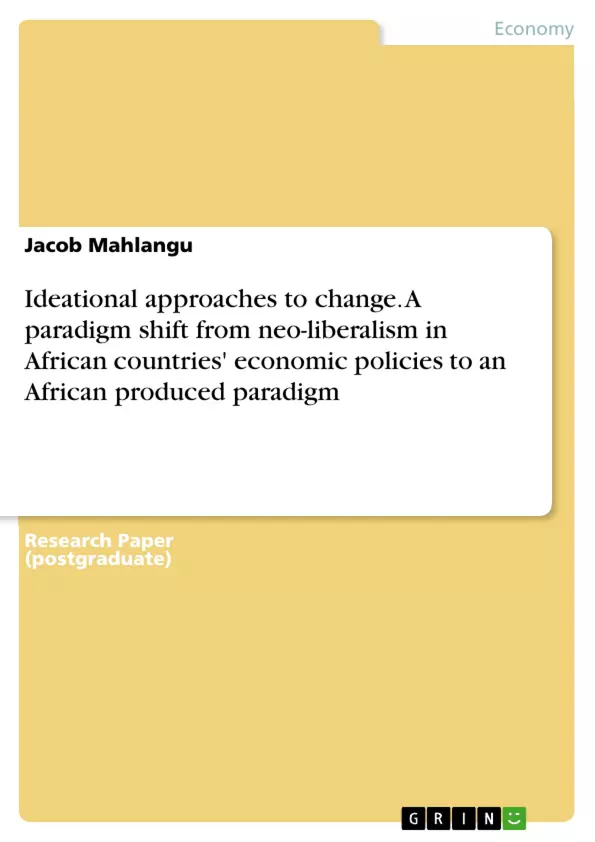The concept of social learning by Peter Hall has created a wide scholarship which supports the fact that a paradigm shift in a policy change could successfully occur through the promotion of knowledge and new ideas instead of a focus on power relations of the influencers of policy. This research paper operationalizes the concept of social learning in the context of the relationship of Bretton woods institutions and African countries. The paper assumes that the failure of the paradigm of neo-liberalism which was imposed by the Bretton woods institutions in their focus on institutional power relations, hegemony and hierarchy to African countries means that the African continent needs a paradigm shift in its countries’ public policy, especially in its countries’ macro-economic policies. Scholars have published their dissatisfaction with neo-liberalism as they claim that it impacted the African countries negatively and further worsened their economic crisis instead of stabilizing it. The paper proposes the application of the concept of social learning in the process of policy formulation by African countries so as to reach a paradigm shift, replacing the paradigm of neo-liberalism with an African produced paradigm.
Inhaltsverzeichnis (Table of Contents)
- Synopsis
- Introduction
- Methodology
- Problem statement
- Research question
- Critical literature Review
- Discussion
- Conclusion
Zielsetzung und Themenschwerpunkte (Objectives and Key Themes)
This research paper examines how African countries can achieve a paradigm shift in their policy formulation and implementation, moving away from the neo-liberal paradigm imposed by Western financial institutions. It explores the concept of social learning, proposed by Peter Hall, as a potential pathway to this shift, and critically analyzes the limitations of the neo-liberal approach in addressing African economic challenges.
- The failure of neo-liberalism in African countries.
- The role of Bretton Woods institutions in shaping African economic policies.
- The concept of social learning as a mechanism for paradigm shift.
- The need for African countries to develop their own economic policies.
- The importance of regional institutions and other forces in influencing policy change.
Zusammenfassung der Kapitel (Chapter Summaries)
- Synopsis: This section introduces the research paper's central argument, highlighting the shortcomings of neo-liberalism in Africa and the potential of social learning to facilitate a paradigm shift. It emphasizes the need for a more African-centric approach to economic policy.
- Introduction: This chapter provides a general overview of the research topic, outlining the failures of neo-liberal policies in Africa and the need for alternative approaches. It also introduces the structure of the paper, outlining its key sections.
- Methodology: This chapter details the research approach employed in the paper, explaining the use of a qualitative research method to explore the complex phenomenon of a paradigm shift. The chapter highlights the interpretive and inductive nature of the research, emphasizing its focus on understanding the process of policy change in Africa.
Schlüsselwörter (Keywords)
This research paper focuses on the following key concepts: neo-liberalism, social learning, paradigm shift, African economic policies, Bretton Woods institutions, structural adjustment programs, regional institutions, power relations, hegemony, and policy change.
Frequently Asked Questions
What is Peter Hall's concept of "social learning"?
Social learning suggests that policy change occurs through the promotion of new ideas and knowledge rather than just power relations and influence.
Why is neo-liberalism criticized in the African context?
Scholars argue it was imposed by Western institutions and worsened economic crises in Africa instead of stabilizing them.
What is the proposed alternative for African economic policy?
The paper proposes an "African produced paradigm" that moves away from the hegemony of Bretton Woods institutions.
What role do Bretton Woods institutions play?
They have traditionally shaped African policies through structural adjustment programs and institutional power relations.
How can African countries achieve a paradigm shift?
By applying social learning in policy formulation and involving regional institutions to create locally-relevant macro-economic strategies.
- Arbeit zitieren
- Jacob Mahlangu (Autor:in), 2017, Ideational approaches to change. A paradigm shift from neo-liberalism in African countries' economic policies to an African produced paradigm, München, GRIN Verlag, https://www.grin.com/document/382671



